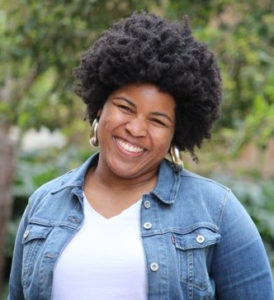
By Tracy Gray, Program Manager & Lead Trainer
“Fine! Y’all keep calling me up to this school and I don’t know what to do with her. So how do I terminate my parental rights? I have to work. I can’t deal with this anymore.” Hearing those words as I stood outside of my classroom with my assistant principal, one of my students, and her mother, was heart-wrenching. That instance solidified what I’d already spent many restless nights thinking about – our school was not adequately supporting the children and families in our community. My deep-seated desire to treat my students with respect and humility was often in conflict with the strategies and suggestions administrators and other educators suggested I use to “get my kids under control.” At the end of the school year I left the school in search of a way to connect with and support children and families without a culture of fear, shame, blame and coercion.
My search for a program that met my passions for social justice and educational equity led me to enroll in the Infant and Family Development and Early Intervention Dual Degree Program at The Bankstreet College of Education and Silberman School of Social Work at Hunter College. After hearing about the ACES study and the detrimental effects childhood trauma can have on future mental and physical well being, I decided to pursue a specialization in Early Childhood Trauma. Thanks to training funded by the National Child Traumatic Stress Network, I was able to dig deep into the roots of childhood trauma and provide direct clinical support to young children who experienced trauma using Child Parent Psychotherapy. I have taken this trauma informed lens into my work in a pediatric clinic, teacher training and coaching, progressive preschools, and a therapeutic nursery school serving children with developmental and physical delays.
As a preschool educator, social worker, and trainer of teachers, I have been able to work closely with young children and their families to build strong foundations from infancy. I am a firm believer in attachment theory – young children develop autonomy and thrive when they grow up with the stability and support of a dedicated, caring adult. I have seen the power of valuing connection with children and families above all else. When conflicts arise and I have to talk with a parent, I approach the situation with a collaborative mindset. Telling a parent that something challenging happened in the classroom can invite overwhelming frustration. Instead, I share the challenge along with my ideas about what I (and my co teachers) can do to help the child, and strategies we are going to put in place. I ask the parent to share strategies they use at home as well. In doing so, I am building a partnership to pull the parent into connection instead of pushing them away.
As the saying goes, “If I only knew then what I know now,” I would not have been standing in the hallway with a frustrated parent and dejected, overwhelmed child. I would have viewed my student’s challenging behaviors in a different light and responded in kind. Looking back, I reflect on the fact that my student had newly transferred to our school after being retained twice at her previous school. Thus, she was physically bigger than all of the other children in the class and had trouble making connections with them. Her life outside the school was no less challenging. Her father was incarcerated, she had been molested, and community violence was a constant threat. The cycle of being sent to the principal’s office and having her mother called in to reprimand her didn’t work. If my administrators and I had used trauma-informed practices we would have focused on creating safety in the classroom and school community and helped her develop regulation skills and social emotional literacy, all within the context of strong, connected relationships. We could have devised a plan to pull her and her family into stronger connection with the school instead of punishing her for normal reactions to abnormal occurrences in her life. As Dr. Ross Greene says, “Kids do well if they can.” When they aren’t doing well, it is up to us adults to become curious about what is happening for the child and work in partnership with them and their caregivers to devise strategies and systems of support.
I am thrilled to join the Echo staff. I believe deeply in Echo’s mission of raising children using a nonviolent, trauma-informed approach. I hope that the trainings and coaching I provide to grownups who work with and care for children will help them develop joyful relationships that nurture the children’s intellectual, social and emotional lives.

Tracy Larry is the Program Manager & Lead Trainer at Echo. She has taught children from birth through adolescence in district, charter, and independent schools. Tracy received her Masters in the Science of Teaching from Pace University in 2006 in conjunction with Teach For America. After teaching for five years, Tracy continued her graduate studies at the Bankstreet College of Education and Silberman School of Social Work at Hunter College, and gained an Infant and Family Development Dual Degree with a specialization in Early Childhood Trauma. Tracy has supported children and families who were experiencing mental health challenges in outpatient mental health clinics and school based settings. She is committed to building strong families and communities through the realms of education and mental health.


